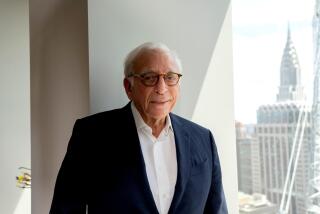Cheesecake Factory’s Winning Mix; Hard Road for PeopleSoft
Stock Exchange gives readers a chance to listen in as staff writers James Peltz and Michael Hiltzik debate the merits of individual stocks and other investments.
Cheesecake Factory (CAKE)
Jim: We’d planned to review this restaurant chain a week ago, but on the night before publication, Cheesecake Factory dropped a bomb on Wall Street, saying its fourth-quarter earnings would come up short of forecasts.
Mike: Right, so we decided it was worth depriving our readers of their morning cheesecake to chew this over for another week.
Jim: That, plus it was a good bet that after Cheesecake’s announcement, its stock was going to get pounded--which it did. And we wanted to take that into consideration.
Mike: In the end, though, nothing’s changed for me. I liked this stock a week ago, and I still do.
Jim: And I’ve come over to your side. I wasn’t going to recommend this stock because I thought it had gotten too pricey. But now that the stock has taken a major hit, I think it’s an attractive buy because I don’t see anything fundamentally wrong with Cheesecake Factory’s business.
Mike: To be honest, Jim, I wasn’t very aware of this company until you proposed we look at it.
Jim: Then you haven’t been eating out much lately, because any time I pick a Cheesecake Factory for dinner, it’s so crowded I can’t get through the door.
Mike: I shouldn’t be allowed in a place named Cheesecake Factory anyway, not because I’m a big fan of cheesecake, but because I assume it’s also likely to serve carrot cake.
Jim: Well, it did start out in 1972 as a baker that peddled cheesecake and other desserts, but today it mainly operates some 28 upscale yet casual restaurants, many in Southern California. In fact, it’s based in Calabasas Hills.
Mike: They have an extensive menu.
Jim: Something for nearly every taste. They serve a variety of meat dishes, pastas, salads, sandwiches, omelets and so on. The decor and ambience are also appealing. The average check runs about $14.60.
Mike: And there’s not a Bruce Willis or Arnold Schwarzenegger in sight, which is all to the good. The point is it’s not over-hyped or overextended with Cheesecake Factories on every corner.
Jim: Not at all. Now, this stock went public in 1992 at $8.90 a share, adjusted for splits since then, but until recently it had been a real laggard. That’s because the company’s earnings basically stalled between ’95 and ’97 due to costs related to restaurant expansion and a new bakery plant. Cheesecake Factory spends a bundle to open each of its stores, something on the order of $4 million to $5 million.
Mike: Plus, Cheesecake takes the time and energy to look for the best locations. Management’s got its eye on quality, and I think its growth is really just beginning.
Jim: And until last week, its earnings had started picking up steam. So the stock had jumped from $15 in late September to the high 20s a week ago, an 80% surge. But after the fourth-quarter disappointment, it’s back down to the low 20s. That’s still about 34 times expected ’98 earnings per share, which is fairly rich.
Mike: But most of the blame for the fourth-quarter shortfall went to Cheesecake’s bakery business.
Jim: Yeah, it’s been trying to boost its bakery sales, but it’s finding that costs related to labor, ingredients and promotions are causing more pain than expected. In fact, some analysts have called on Cheesecake Factory to dump the bakery and focus only on its restaurants.
Mike: Sometimes when a company issues an earnings warning like this, it’s really firing the first shot across investors’ bows. But I don’t think that’s happening here. It was one bad quarter. They got blindsided by some material costs, but overall Cheesecake has a strong business with a franchise name, they’re running exceedingly popular restaurants, and they’re not showing signs of expanding too much too fast--which is the bane of chain restaurants.
Jim: The restaurant does look strong. Its “same-store sales,” or sales of restaurants that have been open at least a year, are expected to rise a handsome 5% for the fourth quarter. I also like that insiders own about 16% of the stock and that Cheesecake is free of long-term debt.
PeopleSoft (PSFT)
Jim: Now, here’s an interesting computer software developer whose leader, David Duffield, is one eccentric fellow. Duffield built this company into a powerhouse and simultaneously infused it with a weird corporate culture.
Mike: Of course, there’s nothing eccentric about being an eccentric in Silicon Valley.
Jim: All right, I stand corrected.
Mike: Sort of a Zoroastrian paradox there.
Jim: Uh, if you say so.
Anyway, Duffield built PeopleSoft into a multibillion-dollar enterprise just within the last decade--and in the process he’s created yet another cult in Silicon Valley, one based on having fun. He basically demands that all his employees have a great time while they’re at work.
Mike: That’s why feature articles about this company often show photos of their top engineers strutting about brandishing Nerf guns and getting ready to play the miniature golf course that apparently is laid out in the hallways.
Jim: Duffield is a CEO who answers his own phone and dances the macarena in front of his co-workers. Regardless, between 1994 and ’98 this company had everything going for it.
Mike: And this was one of the hot stocks on Wall Street. Investors thought the company could do no wrong.
Jim: Absolutely.
Mike: And yet something did go wrong--are you listening, Amazon.com?
Jim: First of all, tell us exactly what PeopleSoft does.
Mike: PeopleSoft is a vendor, much like Oracle and the German company SAP, which are its main competitors, of so-called enterprise software. These are complicated programs that help mostly large and mid-sized businesses manage their most complex internal systems, everything from dealing with their vendors and suppliers to running their human resources, or personnel, operations.
Jim: Hence the name.
Mike: Exactly. PeopleSoft has been one of the pioneers in a field that has the euphonious name of ERP, for enterprise resource planning software. Up to now this has been a terrific business.
Jim: This company was almost doubling its annual sales, year after year.
Mike: And most analysts who look at the potential size of this market talk in the billions of dollars--and that’s just domestically.
Jim: It’s said that European companies are as much as 18 months behind American companies in incorporating these programs into their systems, so the overseas potential for PeopleSoft is just now becoming clear.
Mike: That being said, I look at PeopleSoft as a company that has its work cut out for it.
Jim: As has already begun to show. Let’s describe what happened last year. The stock was soaring, going from below $10 in ‘93-’94 to the high 50s in the early part of ‘98, when suddenly PeopleSoft got really whacked and the company’s aura of invincibility went away in a hurry. It was the old culprit of their sales growth suddenly slowing down.
Poor PeopleSoft. Suddenly they were only reporting, what? 60% to 70% growth?
Mike: That’s right, and they were considered losers. Since mid-April the stock has lost 60% of its value. It now trades in the low 20s and lately has been going almost nowhere.
Jim: And now you say it has even more work cut out for it.
Mike: Let’s start with what’s going to be everybody’s favorite bugaboo this year. That’s the year 2000 problem, which, as you know, is the bug that will make some computers believe they’re in the year 1900 rather than 2000 come next New Year’s Day. This is a company that may get very closely associated with the year 2000 problem, but it’s going to be very hard to appraise whether this is good or bad.
Jim: You mean PeopleSoft is a culprit?
Mike: Well, it’s complicated. Many of PeopleSoft’s customers will have to devote a lot of attention to dealing with this. But no one’s able to say whether this means that potential customers are going to take the money they would have spent installing PeopleSoft products and put it in into other remedial programs to deal with the bug, or whether PeopleSoft might benefit because those customers will have to buy new programs that are known to be year-2000 compliant.
There is also the potential, since this company’s products are so important to the daily operation of so many big enterprises, that if there are crashes in PeopleSoft applications they could face a sizable litigation bill. So basically the jury is out.
Jim: That’s just one problem. Now consider that even though their business is still growing at a pace that a lot of other Fortune 500 companies would envy, when you’re competing against the likes of SAP and Oracle, suddenly the growth rates for this company don’t look nearly as good as they used to. If I were an employee of PeopleSoft I wouldn’t be overly concerned, because it means there’s plenty of work for this company over the next few years. But in terms of boosting the price of the stock, I don’t think there’s enough.
Mike: Well, I see a stock that’s at the bottom of its 52-week range, and although I don’t think this is going to be a hot stock--this is not going to be Yahoo or EBay or Intel ... . .
Jim: . . . or even the PeopleSoft of old. . .
Mike: . . .still, I think it’s a good stock, and priced pretty invitingly here.
Jim: Count me out. I’m troubled that the stock hasn’t recovered hardly at all in recent months, even though everyone seems in agreement that this is a solid company and an industry leader that still enjoys plenty of demand for its products. I’m not sure why Wall Street is so wary of this stock, but it clearly is, and I’d hold off.
Mike: Well, do you blame the company for that or the investment community?
Jim: I blame the investment community.
Mike: But their opinion might change on a dime.
Jim: That’s certainly true.
Mike: It’s been known to happen, and if it does, this is the right place to get in.
*
Do you have a stock you would like to see discussed in this column? Michael Hiltzik can be reached at michael.hiltzik@latimes.com; James Peltz can be reached at james.peltz@latimes.com. Or write to either at Business Section, Los Angeles Times, Times Mirror Square, Los Angeles, CA 90053.
(BEGIN TEXT OF INFOBOX / INFOGRAPHIC)
CHEESECAKE FACTORY
Monday: $22.81
(BEGIN TEXT OF INFOBOX / INFOGRAPHIC)
PEOPLESOFT
Monday: $23.56
More to Read
Eat your way across L.A.
Get our weekly Tasting Notes newsletter for reviews, news and more.
You may occasionally receive promotional content from the Los Angeles Times.










